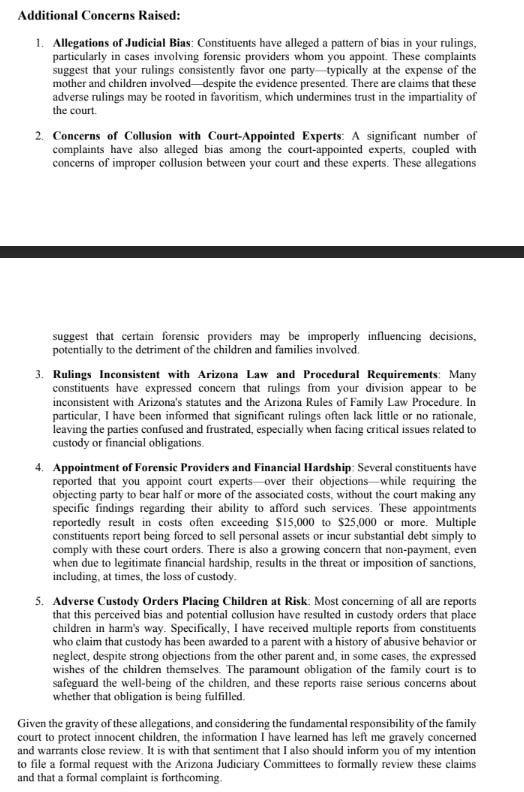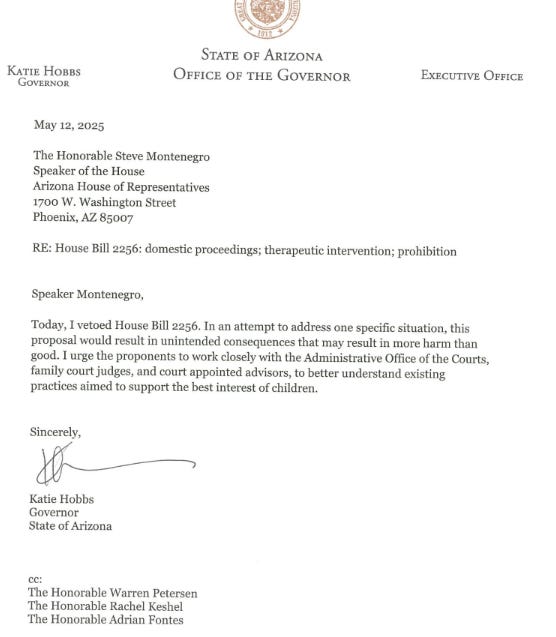Last week, Richard Luthmann and I interviewed Arizona Republican State Senator Mark Finchem about the family court reform movement in his state.
Yesterday, we continued the conversation with Arizona Republican State Representative Rachel Keshel, who co-chairs the ad hoc joint committee on family court orders with Senator Finchem.
It was a wide-ranging discussion, but three things stood out.
Legislative oversight
When most people ask the legislature for help with court- particularly with family court- the legislator is bound to say their hands are tied. They can’t intercede in a case, and any involvement could be seen as a violation of the separation of powers.
Representative Keshel told us she had plenty of legal opportunities for oversight. In particular, she has sent unscrupulous judges and other court actors “letters of inquiry.”
She told us that her journey into family court reform started with grandparents who had spent approximately $4 million fighting to keep their grandchild out of the hands of an abuser.
The judge in that case was Judge Charlene Jackson; check out the story in the Arizona Capitol Times for more on this case.

Representative Keshel received numerous complaints about Judge Jackson, causing her to write a formal “letter of inquiry.”
It’s noteworthy that Representative Keshel did not wade into specific cases, but rather, she asked Judge Jackson about patterns she had discovered.
“As a legislator, you have the right to inquire for your constituents and Arizona resident.” She told us.
Despite that, Representative Keshel said that Judge Jackson recused herself from the initial case after receiving the letter.
It wasn’t only judges who received a letter of inquiry; Representative Keshel sent similar letters of inquiry to prominent court appointees like Raymond Branton.
As with Judge Jackson, Representative Keshel did not ask about specific cases but rather trends and patterns. The message was sent anyway; Branton- who pops up David Segui’s case and Tori Nielsen’s case- had his lawyer respond.
Representative Keshel told us she knew she had stirred a hornet’s nest when she was told that a Mesa Police Detective had been asking about the letters.
The letters led to her colleague, Lisa Fink, to meet with the chief judge of family court. Representative Keshel said she was not invited to the meeting.
Rather than shying away from judicial oversight, Representative Keshel embraced it, and this oversight has created momentum for reform.
Governor Hobbs disingenuous veto
We spoke with Senator Finchem about Arizona Governor Katie Hobbs veto of HB 2256, which would have banned the appointment of therapeutic interventionists unless both parents consented.
Senator Finchem told us that Hubbs, formerly a social worker, was protecting the system with this veto.
Representative Keshel advanced the story by providing the letter Governor Hobbs sent the legislature with her veto.
While Governor Hobbs claimed that the bill was triggered by one case, this is not accurate.
I reached out to Governor Hobbs office about the veto, but I received no response.
David Segui and Tori Nielsen both had therapeutic interventionists (TI) appointed; in Segui’s case, he had multiple TIs appointed.
There are at least fifteen people who are either members of AFCC or have participated in their events who have worked on Segui's divorce from his second wife, Donna.
They are as follows: Raymond Branton {the boy's third therapists}, Kolette Butler {2nd Therapist Interventionist}, Joel Covert {boy's 4th therapist}, Robert DiCarlo {advised mother's lawyer}, Christina Hamilton {father's second attorney}, Carlos Jones {older boy's 2nd therapist}, Mary Ann Lanzilotta {mother's court appointed therapist}, Carol Mellen {father's court appointed therapist}, Kathleen Miholich {did home study}, John Moran {1st therapist interventionist}, Dr. Shanna Sadeh {did trauma assessment for the two minors}, Steven Serrano {did divorce mediation}, Julie Skakoon {boys 1st therapist}, Stephanie Stromfors {current best interest attorney for the minors}, and Diana Vigil {3rd therapist interventionist}.
The ad joint committee on family court orders has held multiple hearings with plenty of testimony. Representative Keshel said many parents complained about bad conduct by TIs in those hearings as well.
As I’ve said, I think the law needs to go even further and ban all court appointees, however, banning TIs is a good start.
Both Representative Keshel and Senator Finchem told us that they think this legislative fight can turn into an election issue for Governor Hobbs who will face the voters in November 2026.
Representative Keshel told us that she has worked with some Democrats on this issue, however, largely, it is the Reublicans who are driving change and reform in Arizona.
They both told us they believe Democrats risk being viewed as anti-family if they continue to obstruct the family court reform bills which will be introduced.
Courts create arbitrary and capricious standards of evidence for proving abuse
Representative Keshel also described what the judges told her colleague, Representative Fink, about who evidence of abuse was not being substantiated in child custody case.
“You can show a picture of a bruise on a child but if you can’t prove the bruise came from the other parent.” Representative Keshel said the head family court judge told Representative Fink.
Representative Keshel said that another problem is that both police and child protective services don’t want to get involved when there is a child custody case.
In Orange County, California, Julie Holburn found that the District Attorney’s Office (OCDA) had a policy not to charge anyone with assault if that assault was to the other parent while a child custody case was ongoing.
This is part of another frustrating pattern I have also found. Courts are creating arbitrary and capricious standards to substantiate abuse.
As I pointed out, criminal convictions have been secured with nothing more than the testimony of an alleged victim.
Here, the judge was saying that a photo, to go along with the disclosure, was still not enough.
Judges would have parents turn into forensic investigators just to satisfy their need for an arbitrary level of proof.
The discussion triggered me to play a recording from Samantha Rucki.
Samantha described her father, David Rucki, as “coming home drunk all they…beating my mom to no end.”
She then described one incident where he ripped an organ leg off an organ and started choking Samantha’s mother, Sandra Grazzini-Rucki, with it.
“When I told Dr. {Jim} Gilbertson this, he said unless you have a videotape of this it never happened.” Samantha said in the recording.
Dr. Gilbertson was a court appointee in that case.
The courts have created these arbitrary standards, in my opinion, because they want to continue abuse cases with no end. Abuse cases create a lot of fees, as David Segui’s case shows, and sue it benefits everyone in the system that abuse is never substantiated.
















